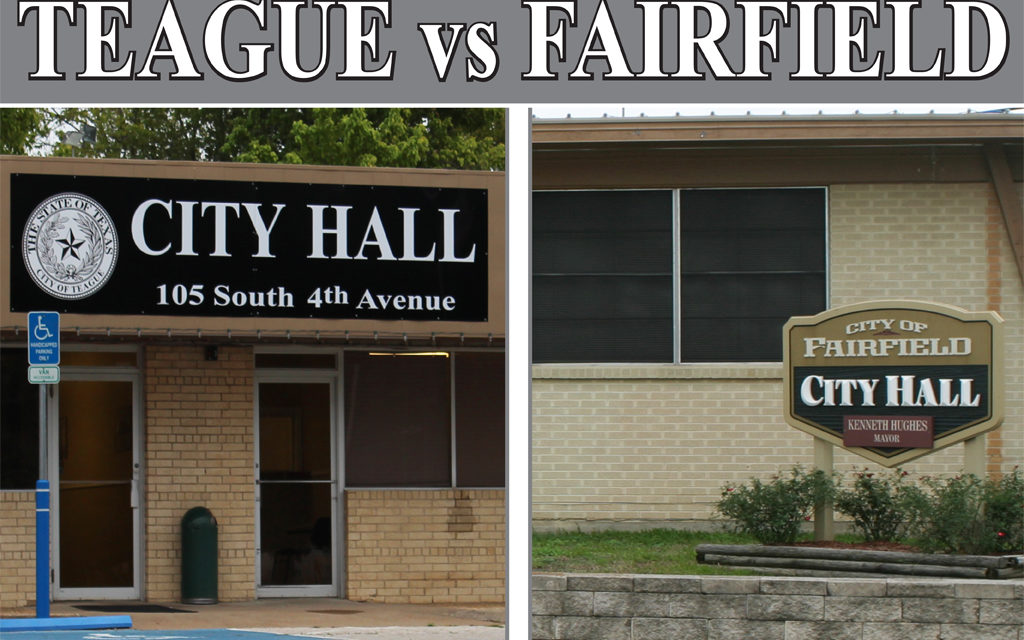“Fairfield has failed to pay Teague its owed revenues for many, if not all years,” states documentation filed with the Freestone County District Clerk on Tuesday, September 18th by Teague’s City Attorney Andy Messer of Messer, Rockefeller & Fort PLLC.
According to the plaintiff’s original petition, a request for temporary restraining order; request for temporary and permanent injunction; and request for disclosure, the City of Teague is seeking monetary damages over $200,000 but not more than $1,000,000.
“A lawsuit will be filed in Freestone County district court on behalf of the City of Teague against the City of Fairfield for breaches of an interlocal agreement and facilities agreement between the cities regarding management of funds from the Texas Department of Criminal Justice, violations of the Texas Open Meetings Act, and for declaratory and injunctive relief.”
According to a press release drafted by Messer, Rockefeller & Fort, PLLC and circulated to local news agency following Monday night’s meeting September 17, 2018, Teague and Fairfield may soon meet in court to address the many discrepancies in the handling of the twenty-eight year old Interlocal Definitive Agreement between the two cities and the Texas Department of Corrections (TDCJ).
After a lengthy consultation with attorneys during closed session, the Teague City Council returned to open session announcing its intention to file suit against the City of Fairfield.
The two page statement drafted on behalf of the City of Teague is based on a 1990 Facilities Agreement and 1992 Interlocal Definitive Agreement (to be referred to as the Agreement) involving Teague, Fairfield, and the TDCJ Boyd Unit located between the two cities on Highway 84.
At the time, the two cities agreed that working together to provide the prison with water and wastewater services would secure jobs for local residents and help promote economic growth in the area, and together entered into an agreement to secure a bond to construct the facilities.
The thirty-year bond is set to be fulfilled in 2020.
Under the Agreement, Fairfield maintains 55% ownership and is responsible for 55% of the operating and maintenance costs of the TDCJ water and wastewater facilities.
Teague owns 45% and is therefore responsible for 45% of the facility costs.
It was agreed between the two cities that Fairfield would serve as operator and initially be responsible for the operation and maintenance of the water and sewer plants as necessary.
The Agreement details that the City of Teague will reimburse Fairfield for 45% of all expenditures associated with the operation and maintenance of the facility.
Although the City of Fairfield has no official statement to make at this time, Interim City Administrator Jana Taylor did confirm with The Times that, according to their records, no reimbursement has been received from the City of Teague for the operation and maintenance of the TDCJ Facilities.
Fairfield was tasked with preparing annual operating plans and budgets for review and approval by both City Councils, generally defining the method of operation and projected annual costs of the facilities.
Earlier investigation shows that Fairfield has not submitted the annual plans and budgets to Teague as outlined in the agreement.
The Agreement also states that revenues from water and wastewater sales will be used exclusively for debt retirement and operating and maintenance costs. Revenues were to be deposited in a special account designated the TDCJ Revenue Account maintained by the City of Fairfield.
Monthly utility payments made by TDCJ to Fairfield were to be disbursed from the Revenue Account to Fairfield’s TDCJ Operating and Maintenance Account, with any remaining monies to be disbursed as 55% to Fairfield and 45% to the City of Teague’s TDCJ Bond Account.
While no Revenue Account exists with the City of Fairfield, both cities confirm that monthly bond payments to the City of Teague in the amount of $10,234.08 have continuously been made.
Maybe the most important provision spelled out in the Agreement is the establishment of a Management Board, to be made up of each city’s mayor and city administrator for the express purpose of providing monthly oversite of activities related to the Agreement.
The Management Board is empowered to make administrative decisions and resolve differences between the two City Councils in the unexpected event a controversy should arise.
According to the Agreement, in the event the Management Board cannot resolve a dispute between the two City Councils, the matter shall be presented to an independent arbitration firm which is mutually agreed upon.
The decision of the arbitration firm will be final and binding to both parties.
Now that the unexpected has become reality, the need for a Management Board seems even more important. However, to date, there is no record of any official meetings of the Board.
Two attempts to schedule a meeting have been cancelled since issues with the execution of the Agreement were first brought to light in April of 2018.
A meeting of the Management Board, now also including attorneys representing each city, has been set for Friday, September 28th.
“In sum, Fairfield has failed to honor its obligations under the agreements,” reads the press release from Teague’s attorneys.
“Because of Fairfield’s alleged misuses and misappropriations of special revenue funds, the City of Teague will seek monies that are due under the agreements.”
“Compounding Fairfield’s mismanagement of records and revenues are numerous alleged violations of the Texas Open Meetings Act. The lawsuit will allege that Fairfield’s city council conducted multiple illegal meetings. The City of Teague seeks actual damages rightly owed under the agreements, as well as injunctive relief against Fairfield. It is anticipated that the actual damages will be significant.”
Click here to read the entire petition, as filed in court documents.
Although execution of the Agreement is still being investigated, what is clear is that since its inception in 1992, neither city has operated as outlined in the Interlocal Definitive Agreement.
The Times will continue to follow the story as it develops.
Megan Hempel reporting.





